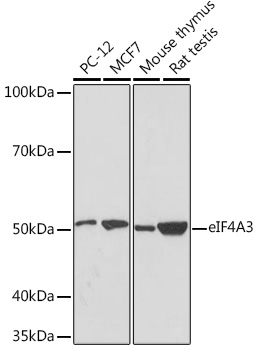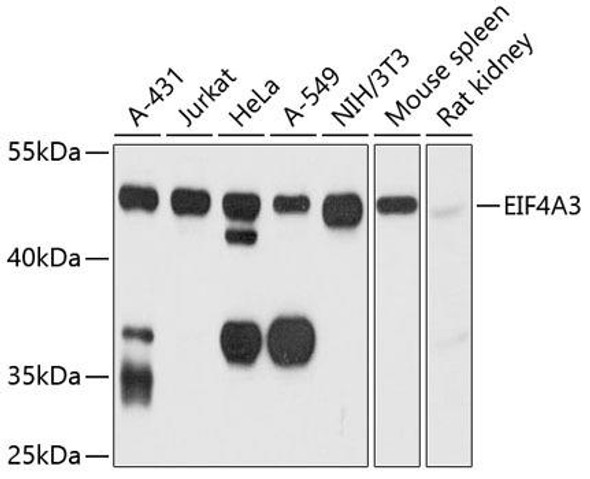Epigenetics & Nuclear Signaling Antibodies 5
Anti-eIF4A3 Antibody (CAB8985)
- SKU:
- CAB8985
- Product Type:
- Antibody
- Reactivity:
- Human
- Reactivity:
- Mouse
- Reactivity:
- Rat
- Host Species:
- Rabbit
- Isotype:
- IgG
- Antibody Type:
- Monoclonal Antibody
- Research Area:
- Epigenetics and Nuclear Signaling
Description
| Antibody Name: | Anti-eIF4A3 Antibody |
| Antibody SKU: | CAB8985 |
| Antibody Size: | 20uL, 50uL, 100uL |
| Application: | WB IF |
| Reactivity: | Human, Mouse, Rat |
| Host Species: | Rabbit |
| Immunogen: | A synthesized peptide derived from human eIF4A3 |
| Application: | WB IF |
| Recommended Dilution: | WB 1:500 - 1:2000 IF 1:50 - 1:200 |
| Reactivity: | Human, Mouse, Rat |
| Positive Samples: | PC-12, MCF7, Mouse thymus, Rat testis |
| Immunogen: | A synthesized peptide derived from human eIF4A3 |
| Purification Method: | Affinity purification |
| Storage Buffer: | Store at -20'C. Avoid freeze / thaw cycles. Buffer: PBS with 0.02% sodium azide, 0.05% BSA, 50% glycerol, pH7.3. |
| Isotype: | IgG |
| Sequence: | Email for sequence |
| Gene ID: | 9775 |
| Uniprot: | P38919 |
| Cellular Location: | |
| Calculated MW: | 47kDa |
| Observed MW: | 50KDa |
| Synonyms: | DDX48, MUK34, NMP265, NUK34, RCPS, eIF4AIII |
| Background: | This gene encodes a member of the DEAD box protein family. DEAD box proteins, characterized by the conserved motif Asp-Glu-Ala-Asp (DEAD), are putative RNA helicases. They are implicated in a number of cellular processes involving alteration of RNA secondary structure, such as translation initiation, nuclear and mitochondrial splicing, and ribosome and spliceosome assembly. Based on their distribution patterns, some members of this family are believed to be involved in embryogenesis, spermatogenesis, and cellular growth and division. The protein encoded by this gene is a nuclear matrix protein. Its amino acid sequence is highly similar to the amino acid sequences of the translation initiation factors eIF4AI and eIF4AII, two other members of the DEAD box protein family. [provided by RefSeq, Jul 2008] |
| UniProt Protein Function: | DDX48: ATP-dependent RNA helicase. Component of a splicing- dependent multiprotein exon junction complex (EJC) deposited at splice junction on mRNAs. The EJC is a dynamic structure consisting of a few core proteins and several more peripheral nuclear and cytoplasmic associated factors that join the complex only transiently either during EJC assembly or during subsequent mRNA metabolism. Core components of the EJC, that remains bound to spliced mRNAs throughout all stages of mRNA metabolism, functions to mark the position of the exon-exon junction in the mature mRNA and thereby influences downstream processes of gene expression including mRNA splicing, nuclear mRNA export, subcellular mRNA localization, translation efficiency and nonsense-mediated mRNA decay (NMD). Constitutes at least part of the platform anchoring other EJC proteins to spliced mRNAs. Its RNA-dependent ATPase and RNA-helicase activities are induced by CASC3, but abolished in presence of the MAGOH/RBM8A heterodimer, thereby trapping the ATP- bound EJC core onto spliced mRNA in a stable conformation. The inhibition of ATPase activity by the MAGOH/RBM8A heterodimer increases the RNA-binding affinity of the EJC. Involved in translational enhancement of spliced mRNAs after formation of the 80S ribosome complex. Binds spliced mRNA in sequence-independent manner, 20-24 nucleotides upstream of mRNA exon-exon junctions. Shows higher affinity for single-stranded RNA in an ATP-bound core EJC complex than after the ATP is hydrolyzed. Belongs to the DEAD box helicase family. eIF4A subfamily. |
| UniProt Protein Details: | Protein type:EC 3.6.4.13; Spliceosome; RNA-binding; Helicase; RNA splicing Chromosomal Location of Human Ortholog: 17q25.3 Cellular Component: nucleoplasm; membrane; cytoplasm; nuclear speck; cytosol Molecular Function:mRNA binding; protein binding; ATP-dependent RNA helicase activity; ATP binding; poly(A) binding Biological Process: nuclear mRNA splicing, via spliceosome; poly(A) tail shortening; mRNA transport; positive regulation of translation; cytokine and chemokine mediated signaling pathway; negative regulation of translation; mRNA catabolic process, nonsense-mediated decay; gene expression; embryonic cranial skeleton morphogenesis; rRNA processing; mRNA catabolic process, deadenylation-dependent decay Disease: Robin Sequence With Cleft Mandible And Limb Anomalies |
| NCBI Summary: | This gene encodes a member of the DEAD box protein family. DEAD box proteins, characterized by the conserved motif Asp-Glu-Ala-Asp (DEAD), are putative RNA helicases. They are implicated in a number of cellular processes involving alteration of RNA secondary structure, such as translation initiation, nuclear and mitochondrial splicing, and ribosome and spliceosome assembly. Based on their distribution patterns, some members of this family are believed to be involved in embryogenesis, spermatogenesis, and cellular growth and division. The protein encoded by this gene is a nuclear matrix protein. Its amino acid sequence is highly similar to the amino acid sequences of the translation initiation factors eIF4AI and eIF4AII, two other members of the DEAD box protein family. [provided by RefSeq, Jul 2008] |
| UniProt Code: | P38919 |
| NCBI GenInfo Identifier: | 20532400 |
| NCBI Gene ID: | 9775 |
| NCBI Accession: | P38919.4 |
| UniProt Related Accession: | P38919 |
| Molecular Weight: | 47kDa |
| NCBI Full Name: | Eukaryotic initiation factor 4A-III |
| NCBI Synonym Full Names: | eukaryotic translation initiation factor 4A3 |
| NCBI Official Symbol: | EIF4A3 |
| NCBI Official Synonym Symbols: | Fal1; RCPS; DDX48; MUK34; NUK34; NMP265; eIF4AIII; eIF4A-III; eIF-4A-III |
| NCBI Protein Information: | eukaryotic initiation factor 4A-III |
| UniProt Protein Name: | Eukaryotic initiation factor 4A-III |
| UniProt Synonym Protein Names: | ATP-dependent RNA helicase DDX48; ATP-dependent RNA helicase eIF4A-3; DEAD box protein 48; Eukaryotic initiation factor 4A-like NUK-34; Eukaryotic translation initiation factor 4A isoform 3; Nuclear matrix protein 265; NMP 265; hNMP 265 |
| Protein Family: | Eukaryotic initiation factor |
| UniProt Gene Name: | EIF4A3 |
| UniProt Entry Name: | IF4A3_HUMAN |







